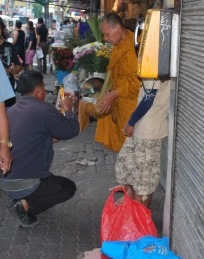Every day, around Bangkok, among other places in the Theravāda world, lay people give gifts to monks. During the spring semester, when taking my son to his school in western Bangkok, I would see groups of monks from the wat just down the road. These monks walk barefoot (!) around the neighborhood, stopping to receive an offering when people proffered them. Monks would often stop by the bus stop, which was a de facto market where people would buy breakfast, and perhaps make merit. (One established market I biked by every day in Chiang Mai advertised itself in the following way: “Make Merit! Fill a monk’s bowl! Buy things! Fresh and Safe!”). Others seemed to have set rounds of houses. There was one monk who I would see standing outside of a house waiting. Normally, the lay people are supposed to wait for the monk, but the occupant of the house was an older woman who could not move quickly. So the monk waited for her, knowing that she liked to make merit most mornings. Normally, lay people give monks (and novices) food at these times, and indeed most of what is given to monks are among the “requisites” that they need for their well-being: food, daily use articles like shavers, pens and paper or books for education, medicine. Less frequently, monks are given new robes, or a begging bowl. Occasionally, though they are given less appropriate things; they are given “bad gifts.”
This week, I am going to give a paper on “bad gifts” at a conference called “The Ethics of Religious Giving: Historical and Ethnographic Explorations,” at the Asia Research Institute at the National University of Singapore. “Bad gifts” are things given to monks that are seen as inappropriate. My research for this paper comes from watching and talking with monks and novices in Thailand and Sipsongpannā, a Theravāda Buddhist minority region in southwest China over the last twenty years. While I can’t discuss everything I say in the paper, there are a few points that I found interesting and worth highlighting here.
What is a bad gift? At first, I thought this would be a straightforward issue to address. A bad gift is something that Theravāda monastics should not have. Obvious choices for this would be alcohol which the most basic precepts in Buddhism forbid or a gun, which as one monk I spoke with noted “can only be used to kill.” However, there is a surprising amount of difference in what would count as a “bad gift,” depending on who you talk to, the area and how the question is framed. For example, in Thailand monks and novices are forbidden from driving cars and motorcycles and bicycles, but in Sipsongpanna in China, they do drive and ride and at least until recently, a bicycle would be offered by relatives or neighbors when a boy ordains as a novice. In other words, a bicycle is a bad gift in Thailand, but not in China. And of course bicycles are not in the vinaya.
What does inappropriate mean? Another question emerges from the way I framed the problem above. If bad gifts are things that are seen as “inappropriate,” what does this mean? Obviously, these would be things that someone says monks shouldn’t have, and presumably this would be because the vinaya says they shouldn’t. Monks can’t drink alcohol according to the vinaya and so beer is not good (though it’s worth noting, I have seen people give alcohol to temples, and monks accept them and have to figure out what to do with this gift). My phrasing comes not from the vinaya but from what Thai monks in particular have said to me when I asked them about bad gifts. They tended to say one of two things: that a given gift or thing is “not appropriate” (mai somkhuan) or “unattractive” (mai suay). The second is particularly striking, because it highlights how monks are often seen/understood as figures who are models for the lay folk. If one were to give cigarettes to a monk, which is not quite forbidden in Thailand, but not encouraged, this would encourage monks to do something that is “unattractive.” Again, this is different in Sipsongpannā, which has been shaped by the cultures of China (where smoking is more common) as well as the Theravāda cultures spread through mainland Southeast Asia. In Sipsongpannā giving cigarettes is not seen as inappropriate.
Who decides? For me, this is perhaps the most interesting point. When talking about Buddhist morality, scholars of Buddhism, monks, and lay folk have collectively tended to emphasize the importance of the vinaya, the disciplinary codes of Buddhism. The vinaya is held up as the authority, even when people are not really paying attention to the vinaya. In fact, part of what seems to be taking place is that at least at the margins, what counts as bad gifts are things that lay people decide are inappropriate or unattractive. As monks will tell you, often with a laugh, bicycles, smart phones and cigarettes are not in the vinaya (though as they also say betel is). As a result, people need to think analogically about what works and what doesn’t. I argue in the paper that despite being “below” monks in the religious hierarchy, it is lay people, in conversation with monks, and the vinaya and government authorities, that decide what counts as a good or a bad gift.

